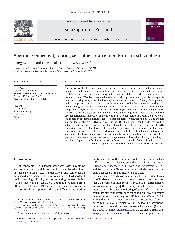摘要
Numerous investigations into schizophrenia have reported impairment in self-other source monitoring, and studies on healthy subjects have suggested that the medial prefrontal cortex (mPFC) is a critical region underlying self-monitoring abilities. In the current study, we examined the mPFC-related modulation of other brain regions in schizophrenia during self-other monitoring using a psychophysiological interaction approach. Twenty-three patients with schizophrenia and 33 healthy controls performed a self-other source monitoring task while undergoing functional magnetic resonance imaging (fMRI) scanning. Independent component analysis was used to identify the mPFC region of interest, and the averaged mPFC time course was extracted and entered into a general linear regression model for use with the psychophysiological interaction analysis, with Self vs. Other monitoring being the psychological condition of interest. Results suggested that connectivity between the mPFC and the left superior temporal gyrus (LSTG) was greater in the Other than the Self condition for the healthy subjects, but this was reversed for the schizophrenia patients, such that mPFC-LSTG connectivity was greater during Self than the Other condition. The modified functional connectivity associated with the performance of recollection of self-source information suggests that schizophrenia patients invoke circuits normally involved in retrieving other-generated information when processing self-generated information, thereby providing a possible biological basis for the self-other confusion characteristic of schizophrenia.
- 出版日期2011-2
